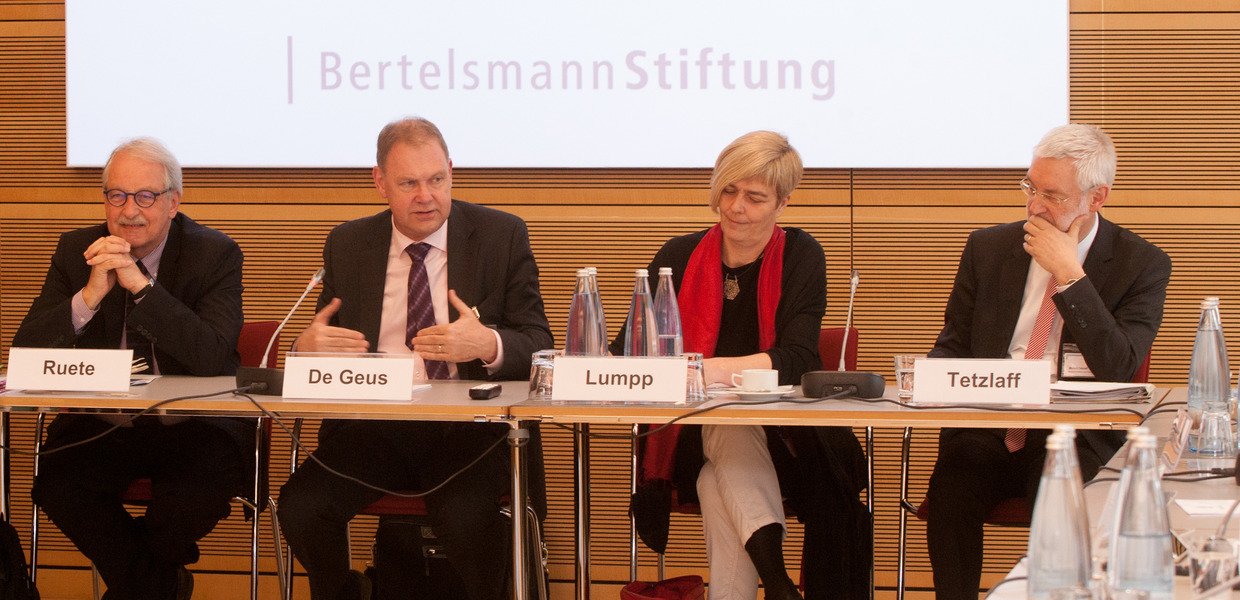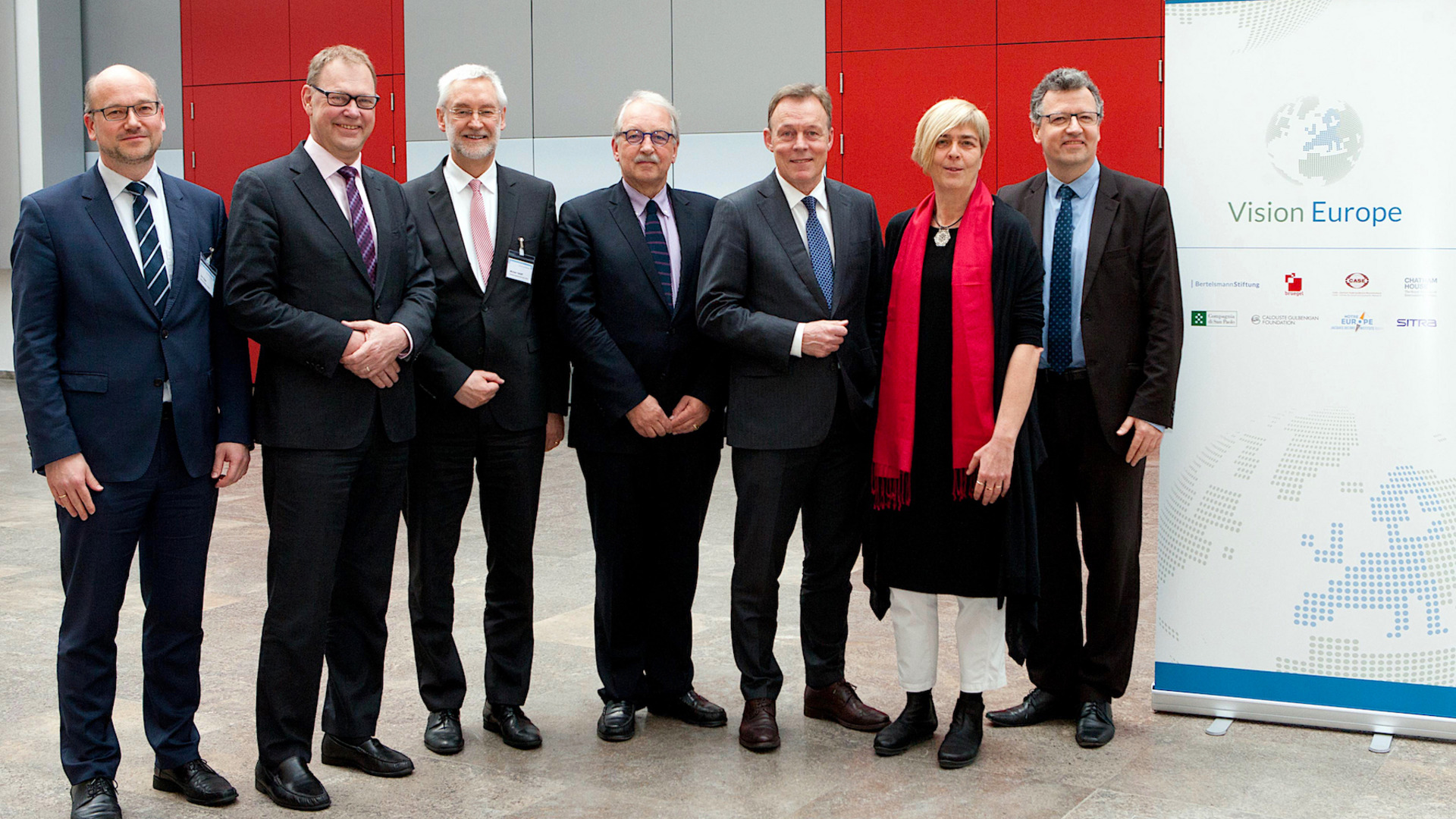Despite the range of differences among European states, how might we design and promote an effective and viable asylum policy? In the face of policies driven primarily by individual interests, is the EU the only means of forging a collective response to challenges? Indeed, doesn't the EU offer an advantage over nation-states acting alone? Though the answer to these questions remains difficult, experts and policymakers broadly agree on what needs to be done, as seen at an expert roundtable hosted by the Bertelsmann Stiftung in Berlin.
EU migration policy concepts and the realities of the EU have simply failed to meet the demands and challenges brought about by the unexpected number of refugees that have recently sought security in Europe. This is the sober conclusion from the German point of view drawn by Head of the Directorate for Migration, Refugees and European Harmonisation Michael Tetzlaff in Germany’s Federal Ministry of the Interior at the Bertelsmann Stiftung’s roundtable follow-up to the Vision Summit 2016 in Lisbon. The reasons for this are in his view rooted in the diversity of interests among different EU member states and normative conflicts of objectives. As a result, consensus runs high when it comes to agreeing on shared and improved controls for European borders while disagreement reigns when it comes to distributing burdens within the EU. The failure to effectively manage migration, he warns, threatens to tear the EU apart and undermine public trust in the EU itself. Tetzlaff nonetheless expressed hope that compromise could be reached on pillar issues, even in the next months.
How best to address these issues? Many roundtable discussants agreed on several points here. A variety of experts and high-level policymakers such as Matthias Ruete, Director-General of the European Commission’s Directorate-General for Migration and Home Affairs, Katharina Lumpp, Representative of the United Nations High Commissioner for Refugees (UNHCR) in Germany and Thomas Oppermann, Chair of the SPD Parliamentary Group, provided additional insights and ideas.
“We have to move away from the isolationist tenor of recent discussions and look at refugee policy in holistic terms,” said Oppermann, pointing to his 5-point plan that prompted considerable controversy. Addressing onsite the causes of flight and regaining control over migration flows are central to these recommendations. For Oppermann, key pillars here involve securing the EU’s external borders, tackling human trafficking, cooperating with North African states along the Mediterranean and creating secure locations for refugees south of the Mediterranean. This is not, he emphasized, a matter of establishing a one-stop agency at gathering centers that point to the best routes to Europe. It is instead, as he described in his much-discussed suggestion, a matter of establishing protective zones in which refugees can evade smugglers, receive medical care, find refuge from exploitation or support for a return home – before being driven to embark on a dangerous journey in a boat.
Director-General of the EU Commission Matthias Ruete reminded discussants that thanks to the initiative of Brussels, much has been achieved recently at the European level. Several refugee and asylum policy initiatives can meet with success only at the European level, not at the level of nation-states. For example, mobility within the Schengen area can be guaranteed only by securing Europe’s external borders.
Broad consensus among European and German points of view was expressed on several further issues, including the need for unconditional protections for refugees as well as monitored processes with secure borders, and the need for legal migration channels as well as orderly resettlement programs for the vulnerable in particular. A desire for a European quota to be distributed across individual member states was expressed, as was a reform of Germany’s immigration law that would replace intransparent regulations that attract people to a disastrous asylum route. Participants also expressed sustained hope for a reform of the common European asylum system through a development of the Dublin rules and the introduction of integration programs in each member state. Pragmatic measures targeting immediate improvements were also discussed along with fundamental demands and long-term objectives.
Though Germany may not be a model country when it comes to managing refugee issues, UNHCR Representative Katharina Lumpp nonetheless pointed to several admirable achievements made by the country in this regard. These include Germany’s success in linking volunteer with government activities and the coordination of federal, state and community measures. The lesson learned from recent experience points to the need for a refugee-influx national contingency plan along the lines of those developed for natural catastrophes. In addition, Lumpp noted, we need to engage in the global and forward-looking coordination of refugee policy. Currently, the greatest challenge is posed by financing ongoing emergency programs such as those in Africa which remain underfunded by donor countries – a shameful state of affairs as underscored by Lumpp.
Emphasizing the complexities of refugee issues and security, Thomas Oppermann countered recent U.S. demands for Europe to spend more on European defense. Pointing to the fact that a military buildup alone will not produce greater security, he said: “Each additional euro invested in defense should be matched by an additional euro invested in development aid.”
The conference “Toward an Effective, Pro-active and Fair Refugee Policy – Germany’s Role in Europe” was held on March 22 in Berlin as a follow-up to the Vision Europe Summit 2016 in Lisbon. <link de unsere-projekte vision-europe> Vision Europe is an initiative of the Bertelsmann Stiftung and seven leading European think tanks and foundations targeting improved evidence-based policymaking in the EU in the interest of European citizens. Improving Europe’s response to the migration and refugee crisis was the theme addressed by UN Secretary General António Guterres at the 2016 Summit in Lisbon.

